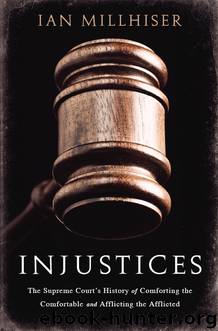Injustices by Ian Millhiser

Author:Ian Millhiser [Millhiser, Ian]
Language: eng
Format: epub, mobi
ISBN: 9781568584577
Publisher: Nation Books
THE WARREN COURT completely abandoned Lochnerism and the broader idea that judges should set the nation’s economic policy—as a unanimous Court announced in 1955:
the day is gone when this Court uses the Due Process Clause of the Fourteenth Amendment to strike down state laws, regulatory of business and industrial conditions, because they may be unwise, improvident, or out of harmony with a particular school of thought. . . . For protection against abuses by legislatures the people must resort to the polls, not to the courts.14
The Warren Court’s embrace of democracy did not eliminate the factions who believe laws intended to protect the least fortunate to be un-American or unconstitutional; it merely shifted the battlefield where they would make these arguments.
As Justice Robert H. Jackson’s law clerk, William Rehnquist appealed to his boss’s fear that a decision ending school segregation would replicate the sins of the Lochner Era. The New Deal Court, Rehnquist wrote in his memo urging Jackson to reaffirm Plessy, “called a halt to” justices “reading [their] own economic views into the Constitution.” Similarly, Rehnquist claimed that the plaintiffs in Brown asked the Court to “read its own sociological views into the Constitution.”15
More than a decade later, however, the future Chief Justice of the United States sounded a whole lot like Justice Stephen Johnson Field and the Liberty League. By 1964, Rehnquist had moved to Phoenix, Arizona, and entered the private practice of law. That year, the Phoenix City Council considered an ordinance that would ban race discrimination at lunch counters and other places of public accommodation. To the man who once defended Plessy to Justice Jackson, this ordinance was nothing less than an attack on “the right to manage your own affairs as free as possible from the interference of government.” Rehnquist was one of only three people who testified against the proposed ordinance before the city council, claiming that “there has never been this sort of an assault on the institution” of private property. Business owners, he insisted, could not be told “who can come” into their place of business.16
When the ordinance passed despite Rehnquist’s objections, he authored a letter to the editor of the Arizona Republic that laid out his objections in more detail. In one respect, Rehnquist’s letter was more moderate than his claim as a law clerk that “Plessy v. Ferguson was right and should be re-affirmed.”17 Race discrimination by the government itself, Rehnquist wrote in his letter, was out of bounds: “all of us alike pay taxes to support the operation of government, and all should be treated alike by it, whether in the area of voting rights, use of government-owned facilities, or other activities.”
Yet, although the somewhat older Rehnquist rejected state-sponsored racism, he also believed discrimination by private businesses to be an entirely different animal. Phoenix’s anti-discrimination ordinance, Rehnquist complained, “does away with the historic right of the owner of a drug store, lunch counter, or theatre to choose his own customers.”18 More than just an attack on property owners’ rights, Rehnquist suggested that the anti-discrimination ordinance was fundamentally un-American.
Download
This site does not store any files on its server. We only index and link to content provided by other sites. Please contact the content providers to delete copyright contents if any and email us, we'll remove relevant links or contents immediately.
| Anthropology | Archaeology |
| Philosophy | Politics & Government |
| Social Sciences | Sociology |
| Women's Studies |
The Secret History by Donna Tartt(16610)
The Social Justice Warrior Handbook by Lisa De Pasquale(11485)
Thirteen Reasons Why by Jay Asher(7782)
This Is How You Lose Her by Junot Diaz(5753)
Weapons of Math Destruction by Cathy O'Neil(5031)
Zero to One by Peter Thiel(4817)
The Myth of the Strong Leader by Archie Brown(4785)
Promise Me, Dad by Joe Biden(4440)
Stone's Rules by Roger Stone(4412)
Beartown by Fredrik Backman(4404)
How Democracies Die by Steven Levitsky & Daniel Ziblatt(4392)
The Fire Next Time by James Baldwin(4337)
100 Deadly Skills by Clint Emerson(4071)
A Higher Loyalty: Truth, Lies, and Leadership by James Comey(4026)
Rise and Kill First by Ronen Bergman(4008)
The David Icke Guide to the Global Conspiracy (and how to end it) by David Icke(3875)
The Farm by Tom Rob Smith(3869)
Secrecy World by Jake Bernstein(3773)
The Doomsday Machine by Daniel Ellsberg(3725)
